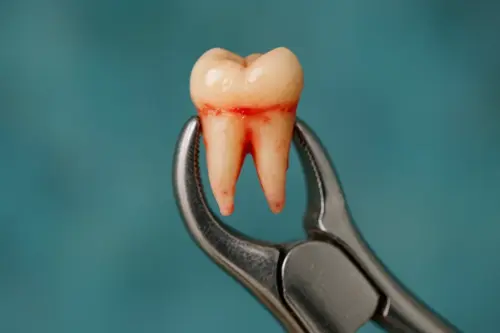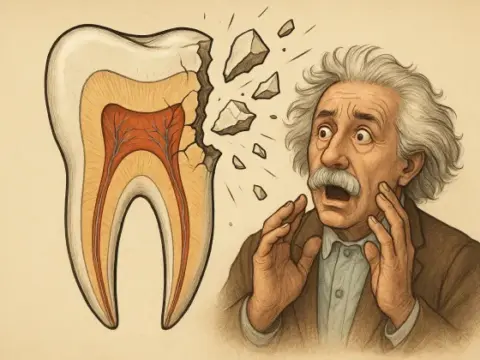The Right Step for Strong Smiles: Expert Tooth Extraction!
Tooth extraction is the removal of a tooth from the bone socket by a dentist or surgical specialist and is usually performed under local anaesthetic. This procedure, which is performed for various reasons such as decay, trauma or orthodontic requirements, is carefully performed to prevent pain and infection. The healing process after extraction may take a few days and during this period, it is ensured that the process is more comfortable with care recommendations such as ice compress, rest, consumption of soft foods.


What You Should Know About Tooth Extraction
What is Tooth Extraction?
Tooth extraction is the removal of a tooth from the bone socket by a dentist or maxillofacial surgeon under local, general or intravenous anaesthesia. Simple tooth extraction refers to the removal of teeth visible in the mouth under local anaesthesia.
In children, tooth extraction is performed to make room for the permanent tooth coming from below or to remove decayed teeth that cannot be saved. In adults, tooth extraction is usually performed in teeth that cannot be saved by root canal treatment, tissue loss due to trauma or decay, orthodontic cases with excess teeth or impacted teeth that have lost their function. For example, if wisdom teeth are a problem, they can be extracted.
What Should Be Considered Before Tooth Extraction?
Tooth extraction is a common dental procedure, but certain precautions must be taken to ensure patient safety and optimal healing. Here are the key considerations:
1. Medical History and Health Conditions
Patients should disclose their full medical history to the dentist. Specific conditions, such as the following, require special precautions:
- Artificial Heart Valves: Increased risk of infection (infective endocarditis).
- Congenital Heart Defects: Patients may need antibiotic prophylaxis.
- Weakened Immune System: Caused by chronic illnesses or medications.
2. Risk of Infection
Harmful bacteria can enter the bloodstream during an extraction. Patients at risk of infections may be prescribed antibiotics as a preventive measure. This includes individuals with:
- Heart conditions or recent surgeries.
- Autoimmune disorders or undergoing chemotherapy.
3. Pre-Procedure Consultation
- The dentist will evaluate your overall health, oral condition, and any underlying risks.
- A treatment plan will be created, including steps for preparation, such as halting specific medications if required.
4. Medication Guidelines
- Antibiotics: Only take antibiotics if prescribed by your doctor or dentist. Unnecessary or improper use can lead to antibiotic resistance.
- Blood Thinners: Inform your dentist if you are on medications like aspirin or warfarin. Adjustments may be needed to prevent excessive bleeding.
5. Oral Hygiene and Nutrition
- Brush and floss gently before the procedure to reduce bacteria in the oral cavity.
- Avoid heavy meals or alcohol before your appointment, as they may interfere with the procedure.
By following these precautions and communicating openly with your dentist, you can ensure a safer and smoother tooth extraction experience.
Healing Process After Tooth Extraction
Healing after a tooth extraction is a natural process that typically follows a series of steps to ensure proper recovery. Here’s what you can expect and how to care for the extraction site:
1. Formation of Blood Clot
Immediately after the tooth is removed, a blood clot forms at the extraction site. This clot is essential as it protects the wound, prevents excessive bleeding, and promotes healing. Avoid disturbing the clot by refraining from rinsing, spitting forcefully, or using straws for the first 24 hours.
2. Initial Inflammation (First 24-48 Hours)
Some swelling and mild discomfort are normal during this phase. To manage these symptoms:
- Apply a cold compress to the outside of your cheek for 10-15 minutes at a time.
- Take any prescribed or over-the-counter pain medications as directed by your dentist.
3. Tissue Healing (Days 3-7)
As the swelling subsides, the body begins repairing the soft tissue. During this stage, follow these guidelines:
- Maintain gentle oral hygiene to keep the area clean.
- Rinse with a saltwater solution to reduce bacteria and promote healing.
- Avoid smoking or consuming alcohol, as these can interfere with the healing process.
4. Bone Healing (Weeks 2-4)
The underlying bone and gums will continue to heal during this period. You may notice the socket starting to close. Stick to soft foods if needed and avoid chewing directly on the extraction site.
5. Full Recovery (4-6 Weeks)
For most patients, complete recovery occurs within 4 to 6 weeks. Larger extractions, such as wisdom teeth removal, may take longer. By this time, the soft tissue has fully healed, and the site is stable.
When to Contact Your Dentist
If you experience excessive bleeding, severe pain, signs of infection (such as fever or pus), or dry socket symptoms (exposed bone, bad taste, or persistent pain), contact your dentist immediately.
Proper aftercare is crucial for a smooth recovery. Follow your dentist’s instructions closely to ensure optimal healing and prevent complications.
How Tooth Extraction Is Performed
The tooth extraction is usually performed under local anaesthesia and may require cutting the gum and bone tissue if necessary. The blood clot formed after the extraction starts the healing process and bleeding is controlled with gauze. In complicated cases, if the clot drops, there may be a risk of infection and treatment is applied.
What should be considered after tooth extraction?
The healing process after the extraction may take several days. Control of bleeding, use of painkillers, ice compresses and physical rest are recommended. Movements that create negative pressure should be avoided within 24 to 48 hours after extraction. After 24 hours, you can gargle lightly with salt water.
Recovery after tooth extraction
The initial healing period is usually 1-2 weeks. Since tooth loss can cause neighbouring teeth to shift, implant or fixed bridge treatments may be recommended.
How Much Does Tooth Extraction Cost?
Since there are many factors affecting tooth extraction, from patient health to tooth complexity, pricing is communicated to our patients after the consultation.



